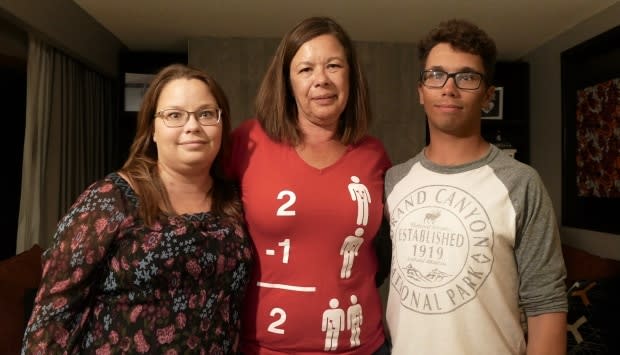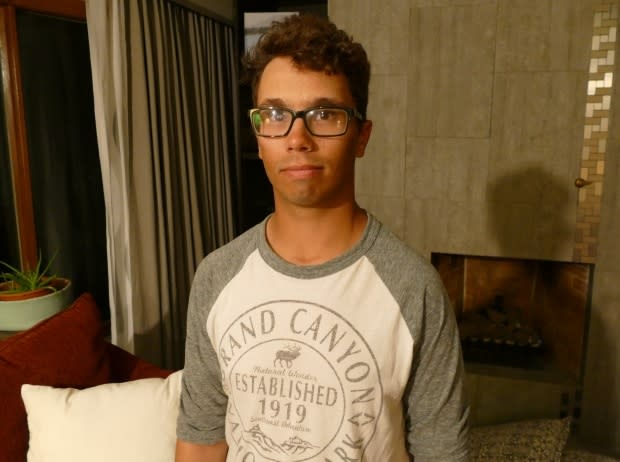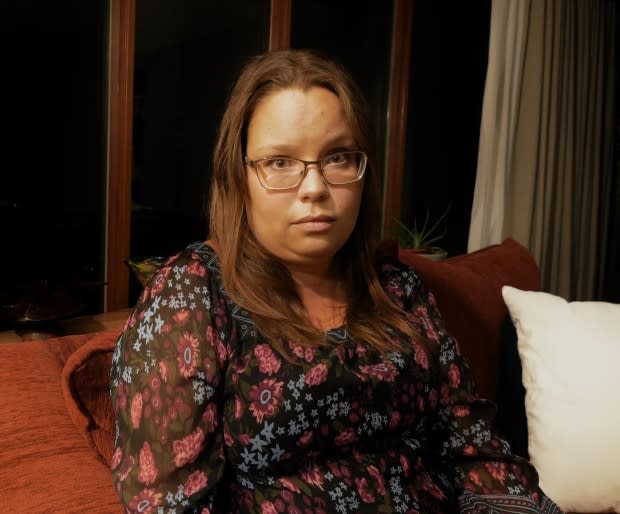'Every day waiting': Why one Manitoba family is waiting for two kidneys
Like all brothers and sisters, Sam and Adam Schellenberg share a bond.
But they also share a bond most siblings don't.
Both Sam and Adam have polycystic kidney disease. At age 11, both had kidney transplants which later started to fail.
Now, they're both in need of another Type O kidney.
"It's not nice that he has what I have, but it's nice knowing that there's someone in my corner that isn't just going, like, 'Oh, we're here for you'," said Sam.
"It's nice to know that there's someone that actually knows what it's like. How hard it is."
Sam, 30, and Adam, 25, lead very different lives in many ways. She works as a collections manager and archivist at the Winnipeg Railway Museum and he works 10-hour days in construction.
But three nights a week, they both end up at the same hospital for dialysis.
On treatment days, Adam drives straight from work to his dialysis appointment. He's up again for work at 5 a.m. the next morning.
His sister calls him the strong one. But listening to what they've gone through, it's clear they're both pretty tough.

When she was four months old, Sam was diagnosed with polycystic kidney disease, which results in cysts growing on the kidney. That, in turn, can result in symptoms like frequent infections and kidneys that don't function properly.
At age 11, Sam received a donor kidney from her father.
"I remember asking the doctor before, 'Am I gonna die?'" said Sam. "I was worried about it."
Adam, who was diagnosed when he was about a year old, ended up also getting a kidney transplant at age 11. His came from a deceased donor.
"Everyone at school thought it was pretty cool," Adam said.
By 2006, when Sam was 17, reality started to hit that her transplant was failing, she said.
When she was 18, her medical team started prepping her for dialysis.
"I didn't tell my parents for a long time 'cause, you know, you don't want them to worry," said Sam. "They already worry so much."

Adam found out his transplant was failing in 2015.
"I kind of just go with the flow with stuff," said Adam. "I didn't like knowing that now I have to go on dialysis.… It was kind of overwhelming a little bit at first, and then you just kind of get used to it."
In many ways their paths and treatments have been similar, but their outlook on whether they'll find a donor match for a new kidney is different.
"I'm hopeful that I get one," said Adam.
Sam is less optimistic.
"I'm in the 99th percentile, and that means 99 per cent of people don't match with me," said Sam.
"I don't know if it's just something about being waiting already for almost nine years.… It chips away at you. And you just kind of lose hope. And you just kind of accept that this is how life is going to be."
200 Manitobans waiting
The reality is Sam and Adam are among the roughly 200 Manitobans waiting for a kidney.
On average, a kidney transplant from a living donor lasts between 20 to 25 years. A kidney from a deceased donor lasts on average about 10 to 15 years, said Dr. Leroy Storsley, medical director of the Living Kidney Donor Program with Transplant Manitoba.
"Those are just average numbers," he added. "Some may last longer than that, some may last … significantly less time than that."
The wait time in Manitoba to get a donated kidney varies based on a number of factors, including blood type.
For example, Storsley said people who need a blood Type O kidney — like Sam and Adam — could wait eight to 10 years to get one from a deceased donor, while the wait time for a Type A kidney is probably closer to five years.
But it can be more challenging to find a match if a person has previously had a transplant.
"If someone has a transplant that's failing, often during the course of that … their immune system makes antibodies toward the kidney that they have," Storsley said.
Those antibodies may then make it difficult to find a compatible kidney.
Storsley said recipients in Manitoba can receive a kidney from a deceased donor, or a living donor who is a relative or someone with whom the recipient has an "established relationship."
But Storsley said Transplant Manitoba is continuously reviewing its approach to kidney donation policies, and in the meantime, there are other options — like the Kidney Paired Donation Program, run by Canadian Blood Services.
The program collects information about people who need transplants and those who want to donate a kidney to a specific person but aren't a match, said a Canadian Blood Services spokesperson by email.
An algorithm then matches people from the information collected.
People who don't have a specific recipient in mind can also sign up for the program.
'Someone needs it'
As Sam and Adam wait to learn whether they'll find a match, so does their mother, Cyndi Myskiw.
The entire family, she said, "is praying and on pins and needles, and hoping and getting depressed waiting," said Mysliw. "We're all just waiting. Every day waiting."
She said about two years ago, Sam ended up needing heart surgery after an infection linked to the catheter line used for her dialysis. It drove her to make T-shirts pleading for a Type O kidney for her daughter.
"We almost lost her and I needed to do something to get her a kidney," said Myskiw. "This was my something."

Myskiw encourages people to sign up for Transplant Manitoba's online registry, signupforlife.ca, to become organ donors.
"People need to know that organs are hard to come by," she said.
Adam said one of his friends has agreed to join the Kidney Paired Donation Program.
"I asked her just out of a whim kind of and she said absolutely," he said. "[I] wasn't expecting it."
Sam, whose position on the wait list in Manitoba is currently on hold until she is healthy enough to receive a kidney, encourages everyone to think about donation.
"You should sign that paper in your driver's licence. You should sign up online to be a donor," she said.
"If it doesn't result in a kidney for me then maybe it will result in a kidney for somebody I don't know, or a pancreas, or a liver, or a heart. I don't know. Whatever you can donate.
"Someone needs it."


